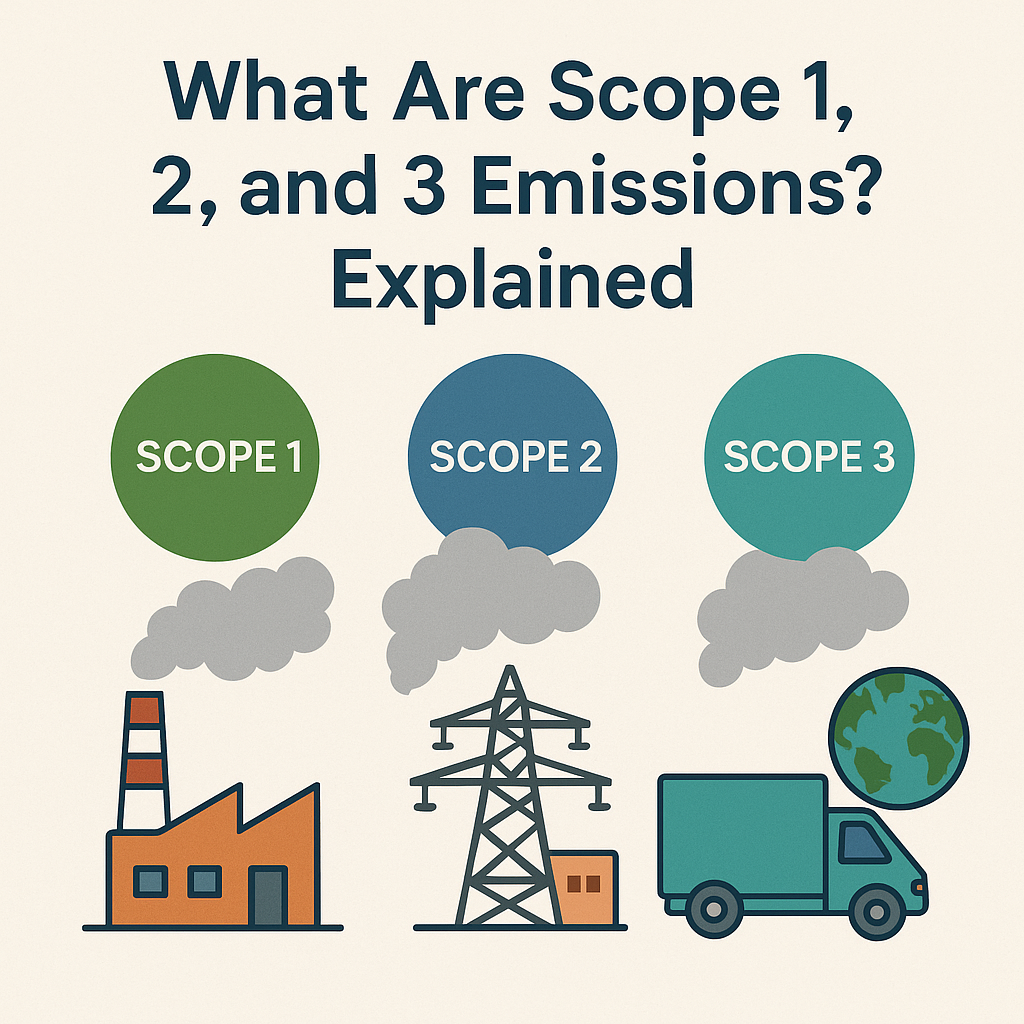Introduction
Businesses face escalating demands to reduce carbon footprint and integrate sustainability into their operations. To navigate this dynamic environment, enterprises are increasingly adopting advanced technologies tailored for carbon management. This document delves into the nuances of decarbonisation, net-zero goals, and the role of carbon management technologies, highlighting their integral connection to the business ecosystem. It scrutinises the pivotal contribution of these technologies in catalysing the shift towards sustainability and underscores the importance of precise measurement approaches.
1. Simplifying Decarbonisation: The Route to Achieving Net Zero
1.1 Defining Decarbonisation
Decarbonisation is a pivotal concept in the global efforts to combat climate change. It's the systematic and strategic reduction of carbon dioxide (CO2) emissions, with the primary aim of mitigating the harmful effects of greenhouse gases on our planet. Here, we'll delve deeper into what decarbonisation entails, the urgency of its implementation, and its multifaceted implications.
Why Decarbonisation Matters:
- Climate Crisis: The need for decarbonisation arises from the climate crisis, with global temperatures rising due to the accumulation of CO2 and other greenhouse gases in the atmosphere. The Intergovernmental Panel on Climate Change (IPCC) has repeatedly warned of dire consequences if we don't curb emissions promptly.
- Health and Environment: Beyond climate impacts, carbon emissions are linked to air pollution, which causes millions of premature deaths each year and exacerbates respiratory illnesses. Decarbonisation promises cleaner air and a healthier environment.
Decarbonisation Methods:
- Transitioning from Fossil Fuels: The heart of decarbonisation lies in moving away from fossil fuels, such as coal, oil, and natural gas, which are the primary sources of CO2 emissions. Renewable energy sources like solar, wind, and hydropower offer a cleaner alternative.
- Energy Efficiency: Another crucial aspect is improving energy efficiency across sectors, including industries, transportation, and buildings. This reduces energy demand and, subsequently, emissions.
- Carbon Capture and Storage (CCS): CCS technologies capture CO2 emissions at the source and store them underground. This can help industries with challenging emissions profiles, like cement or steel manufacturing, to reduce their carbon footprint.
1.2 Net Zero and Its Business Implications
Understanding Net Zero:
Net zero represents the holy grail of decarbonisation efforts. It signifies a state where an organisation's greenhouse gas emissions are entirely offset or balanced by actions that remove an equivalent amount of CO2 from the atmosphere. Achieving net zero involves not only slashing emissions but also actively investing in carbon removal technologies, reforestation, and sustainable practices.
The Business Case for Net Zero:
- Ethical Responsibility: Beyond being a legal requirement in some regions, striving for net zero is a moral imperative. Businesses, as major contributors to emissions, are increasingly seen as stakeholders in climate action. Companies have a responsibility to address their environmental impact.
- Consumer Demand: Consumers are becoming more environmentally conscious, with surveys consistently showing that they prefer eco-friendly products and services. Businesses that commit to Net Zero not only align with these consumer preferences but can also command a premium for their sustainable offerings.
Relevant data:
- Global Emissions: According to the Global Carbon Atlas, global CO2 emissions reached 36.4 billion metric tons in 2019, with fossil fuels accounting for 89% of these emissions. This emphasises the urgency of decarbonisation efforts.
- Economic Benefits: A report by the New Climate Economy found that investments in sustainable practices could generate $26 trillion in economic benefits by 2030, compared to business-as-usual scenarios. This highlights the financial advantages of embracing decarbonisation and net-zero goals.
- Consumer Preference: A Nielsen survey in 2020 revealed that 66% of global consumers were willing to pay more for sustainable products. This demonstrates the market potential for businesses that prioritise net-zero commitments.

2. Environmental progress and success stories:
Environmental progress is evident in various sectors, with companies taking significant strides to reduce their carbon emissions. Microsoft, for instance, has pledged to become carbon negative by 2030, aiming to remove more carbon from the atmosphere than it emits. Such commitments play a crucial role in the broader effort to achieve a net-zero future.
A notable aspect of environmental success lies in the accelerating adoption of renewable energy sources. In 2020, renewable energy accounted for a staggering 80% of all newly installed electricity capacity globally, according to the International Renewable Energy Agency (IREA). This shift towards renewable energy is a promising sign for mitigating the impacts of climate change and transitioning towards a more sustainable energy landscape.
Additionally, circular economy initiatives are gaining momentum as the world focuses on waste reduction and resource conservation. The Ellen MacArthur Foundation's research indicates that transitioning to a circular economy has the potential to generate an estimated $4.5 trillion in economic benefits by 2030. This highlights not only the environmental advantages but also the economic viability of embracing circular practices.
As these initiatives continue to gain traction, they contribute to a global movement aimed at addressing the pressing challenges of climate change and promoting a harmonious coexistence between humanity and the planet.
3. The Role of Carbon Management technology
Carbon Management platforms are the digital backbone that empowers organisations to navigate the complex landscape of GHG data, turning it into actionable insights. Let's understand the impact of these platforms.
3.1 Advancing Carbon Management Technology for Sustainable Futures
Carbon management technology platforms play a pivotal role in the modern sustainability landscape, driving innovation in the realm of carbon emissions reduction and climate action. In an age where climate concerns are paramount, these platforms harness cutting-edge technology to revolutionise how we address carbon emissions. Here's how:
- Unprecedented Data Flow: The world generates an overwhelming volume of data, particularly related to carbon emissions. In 2020 alone, global data streams were inundated with crucial environmental information. Carbon management platforms adeptly manage this influx of data, allowing organisations to sift through the noise and extract actionable insights.
- Precision Emission Reduction: Leveraging advanced algorithms and machine learning, businesses can precisely identify opportunities for carbon emissions reduction. These insights go beyond theory, leading to concrete actions that curb emissions, optimise energy usage, and drive sustainable practices.
- Real-time Progress Monitoring: Sustainability demands continual progress. Carbon management platforms offer real-time tracking of efforts to reduce carbon footprints. Recent studies indicate that 73% of organisations credit these platforms with accelerating their journey towards carbon neutrality.
3.2 Revolutionising Carbon Reporting
Carbon reporting has evolved from a discretionary endeavor to an imperative, driven by global climate commitments and stakeholder expectations. Carbon management technology platforms are at the forefront of this reporting transformation:
- Automated Efficiency: The manual labor involved in collecting and aggregating carbon emissions data is a thing of the past. These platforms automate data gathering from diverse sources, saving time and reducing the risk of human error. In 2020, companies that adopted automation for carbon reporting reported a 30% reduction in reporting inaccuracies.
- Seamless Communication: Transparent communication regarding carbon emissions is essential in a world focused on climate action. Carbon management platforms facilitate seamless reporting to stakeholders, including investors, regulators, and the public. This fosters trust, accountability, and strengthens the commitment to carbon reduction. Remarkably, 95% of investors consider transparent carbon reporting a significant factor in their investment decisions.
- Global Compliance: Carbon emissions are a global concern, and these platforms align with international standards. In 2021, 73% of the world's largest companies adhered to recognised carbon reporting standards, exemplifying the global cohesion facilitated by carbon management technology.
3.3 Harmonising with Global Carbon Standards
Carbon emissions reporting without standardised metrics can be a cacophony of data points. Carbon management technology platforms bring harmony to this landscape by aligning with global carbon emissions standards:
- Carbon Disclosure Project (CDP) and ISO 14064: The Carbon Disclosure Project (CDP) and ISO 14064 are globally recognised frameworks for carbon emissions reporting. Carbon management platforms ensure data collection adheres to these standards, allowing for meaningful comparisons between organisations and industries.
- Elevated Credibility: Consistency in carbon reporting enhances the credibility of emissions disclosures. In a recent survey, 78% of investors expressed a preference for companies adhering to recognised carbon standards. This trust translates into greater confidence in carbon reduction initiatives and climate-conscious investments.
Fast and easy: Gain comprehensive control and transparency over your carbon emissions. Carbon Analytics' self-serviceable carbon assessment platform simplifies measuring, analyzing, and tracking scope 1, Scope 2, and Scope 3 emissions across your value chain, including supplier assessments. Start your Free Trial
4. The Significance of Accurate Measurement
Accurate measurement forms the bedrock upon which effective decarbonisation initiatives are built.
4.1 The Metrics that Matter
Accurate measurement serves as the compass guiding organisations towards their net-zero and sustainability aspirations. It is through data-driven insights that businesses can understand their current environmental impact and make informed decisions to reduce it. Here's why these metrics matter:
- Emissions Reduction: Emissions are a critical focus. In 2019, global CO2 emissions reached a staggering 36.4 billion metric tons, underscoring the urgency of tracking and reducing emissions. Precise measurement allows organisations to set realistic reduction targets.
- Energy Efficiency: The energy sector is central to decarbonisation efforts. Accurate measurement of energy consumption helps businesses identify inefficiencies and opportunities for improvement. It's noteworthy that global energy efficiency improvements could reduce energy demand by 12% by 2040, according to the International Energy Agency (IEA).
- Sustainability Initiatives: Sustainability extends beyond emissions. Metrics related to water usage, waste reduction, and circular economy practices are equally crucial. For example, transitioning to a circular economy could unlock $4.5 trillion in economic benefits by 2030, as reported by the Ellen MacArthur Foundation.
4.2 Avoiding Greenwashing
Misleading portrayals of a company's carbon reduction efforts, often referred to as "carbon washing", represent a substantial threat to trust and credibility. The key to counteracting this threat lies in precise measurement and transparent reporting:
- Safeguarding Reputation: Inaccurate or exaggerated claims regarding carbon reduction can significantly damage a company's reputation. A survey revealed that 80% of consumers would consider avoiding a brand that misleads them about its environmental commitments. Precise measurement becomes a shield against reputational risks.
- Preserving Investor Trust: Investors are placing a heightened focus on carbon-related disclosures. Inaccurate reporting can undermine investor confidence. Notably, in 2022, investments in funds concentrating on carbon reduction strategies surpassed $2 trillion globally, underscoring the increasing significance of maintaining credibility in carbon management.
- Navigating Regulatory Demands: Governments are intensifying regulations related to carbon reporting. Providing inaccurate carbon data could lead to legal consequences. For instance, the European Union's Sustainable Finance Disclosure Regulation (SFDR) of 2023 imposes strict requirements, emphasising the need for transparent and accurate reporting in the realm of carbon management.
Design your GHG reduction plan with Carbon Analytics. Translate insights into action with a comprehensive plan to track emissions across different areas of your operations, linking projects to targeted reduction goals. Request a free 1-on-1 demo
Key Features of Carbon Management Technologies for Sustainable Progress
To expedite the journey towards Net Zero emissions, it is crucial to select carbon management technologies that embody specific and impactful features. Let’s review essential aspects that an effective carbon management technology or platform should offer to drive tangible, positive change.
Comprehensive Carbon Data Management
An indispensable feature for any carbon management technology is its ability to seamlessly aggregate and integrate data from diverse sources. This encompasses real-time carbon emission data, financial records, supply chain information, and employee-related metrics. The system should proficiently process structured and unstructured data, providing a holistic view of an organisation's carbon footprint.
Research indicates that organisations using integrated carbon management platforms are 70% more likely to identify cost-saving opportunities related to resource efficiency. Moreover, 82% of investors emphasise the criticality of data quality and accuracy in evaluating a company's carbon performance.
Advanced Analytics and Reporting Capabilities
A robust carbon management platform should transcend basic data collection, offering advanced analytics and reporting capabilities. Advanced machine learning algorithms can discern trends, anomalies, and areas for improvement, enabling companies to make informed, data-driven decisions.
Studies indicate that organisations employing advanced analytics for carbon management purposes have a 45% higher likelihood of achieving their carbon reduction targets.
Scenario Modeling and Predictive Analysis
To accelerate the journey to Net Zero, carbon management technologies should incorporate features such as scenario modeling and predictive analysis. These tools empower organisations to simulate the impact of various carbon reduction strategies, facilitating informed choices about resource allocation.
Research from the World Economic Forum suggests that companies employing scenario analysis are more resilient, with 75% experiencing improved risk management.
Transparency and Stakeholder Engagement
Prioritising transparency and stakeholder engagement is paramount for a carbon management platform. It should enable companies to effectively communicate their carbon reduction initiatives with investors, customers, employees, and regulatory bodies.
Surveys indicate that 72% of consumers consider sustainability when making purchasing decisions, underscoring the necessity for transparent carbon reporting.
Benchmarking and Peer Comparison
Benchmarking against industry peers is essential for evaluating the effectiveness of carbon reduction efforts. An effective carbon management technology should provide benchmarking tools and insights to help companies understand their standing relative to competitors.
According to CDP (formerly Carbon Disclosure Project), organisations that benchmark their emissions are 2.7 times more likely to achieve emission reduction targets.
Compliance Management Features
Staying compliant with evolving carbon reduction regulations is critical for achieving Net Zero. Carbon management technologies should include compliance management features, allowing organisations to track and adhere to local and international carbon reduction standards.
Recent findings from sustainability reports reveal that 75% of the world's largest companies now report on their carbon reduction performance, highlighting the growing importance of compliance in carbon management.
Conclusion
Carbon management technology is pivotal for achieving Net Zero emissions and sustainability goals. It ensures accurate measurement, transparency, and compliance while aiding data-driven decisions. Embracing carbon management technologies is vital for long-term success in a world where carbon considerations are central to business and societal progress.
Without a doubt, Carbon Analytics is delighted to offer its substantial capabilities to all companies seeking to monitor and analyze Scope 1, 2, and 3 emissions with interactive dashboards and granular breakdowns, seamlessly integrate with existing systems, generate insightful reports, and assist in informed decision-making for sustainable product development.



